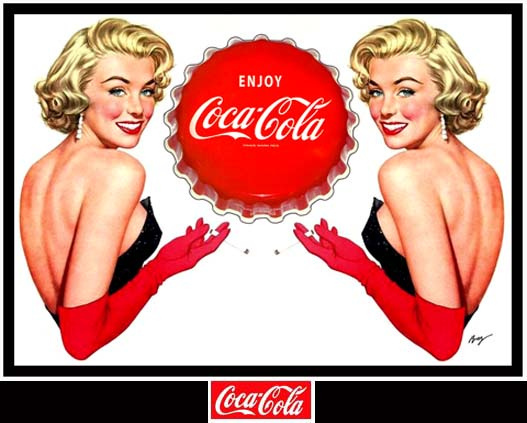I was scared of Mad Men for a long time. Even as it racked up Emmys and accolades, I wouldn't watch.
I'd lived through Happy Days and other treacly tributes to the '50s and '60s that didn't ring anything like true. They'd glossed over or just plain avoided the ugly stuff I'd lived through as a black girl growing up in that very white world.
I was about to graduate from high school right about the time the fictional Mad Men world ended -- only a little older than Sally Draper. So I was there when they first unleashed that now much-debated Coke commercial that brought the finale to such a mischievous end. I sang right along, back then. With a snarky smirk.
But it made me smile, that last night -- what a wonderful "wink" that was. Even though Don Draper was still, to the bitter end, "The Man" we used to rail against in those days. A cynical suit, biting off bits of our counter culture and selling it back to us with clever jingles that stuck in our heads no matter how hard we fought.
Everything we did wound up packaged up neat and sold for 'way more than we could afford. Even the Salvation Army clothes we bought and tarted up became so fashionable that they were sold out in all our favorite second hand stores. Worn by debutantes at flashy discotheques. Clothes, music, neighborhoods -- everything we touched was eventually "gentrified."
So... given that, why was that finale such a heart-wrenching experience for me? And millions of others who actually lived through that era?
Mad Men's genius lay in the way it deftly avoided the clichés the others clung to. In fact, it defied formulas, period, as great literature always does. The only thing you knew for sure was that a curve ball was coming. And you might not be able to duck in time.
Yes, the wardrobe and sets were picture perfect and Don Draper was the quintessential company man -- as that finale ending made even clearer. There he was, still in his white shirt, smiling and "om-ing" in lotus as he dreamt of the Coke ad he would write as soon as he found a way off that beach and back to his desk.
But in the polarized world Mad Men depicts -- and the tumult of the '60s was every bit or even more contentious than our current culture wars -- we stubbornly and steadfastly refused to budge an inch away from our various party lines. And so we never got a good look at each other. Or allowed ourselves to really "see" each other.
We weren't just divided by race. White folks were mad at each other, too, I was shocked to learn, when my parents moved us into a predominantly white 'hood for high school. My hippie friends hated straights, though we waxed poetic about "peace and love." Their mostly arrow-straight parents hated hippies, with reason, I fear, after fighting their way up those career and social ladders only to be ridiculed by their own children.
Too many of us forgot that those soldiers didn't cause or ask to go to Vietnam. Mad Men dealt with this brilliantly a few episodes before the last, when Glen Bishop, angered by Sally's knee jerk reaction to his enlistment, hotly retorted, "What about a bunch of Negro kids dying while we just sit at home getting stoned?"
A few of my own high school friends signed up for exactly that reason. But I was more like Sally at the time -- most my friends were. We could not have taken to the streets or sat in on campus if we'd let ourselves think too deeply, I suppose.
So it just wasn't cool to think that maybe those Grace Kelly blonds on Michigan Avenue cried inside and alone at night while their blue-suited husbands worked 'way too hard and drank 'way too much trying to sedate the wild child crying inside them, too.
That wasn't pain. I was black/female/a teenage kid. I knew what real pain was. In fact, my white friends all walked out of classes after MLK's assassination in "solidarity" with me and my pain.
But we were all in pain. And in the midst of a maelstrom the likes of which our young country had never seen before.
Parents watched in horror as the children who had turned on them were shot dead in the streets when men they paid to "serve and protect" turned on their children instead. JFK died. Malcolm X died, MLK died, civil rights workers died, three little black girls died, Bobby Kennedy died, thousands of soldiers and civilians died--the complacency and odd, blind "innocence" of the 50s died, violently, before our eyes on TV.
Who could think?
Mad Men made me think. Over and over and over again, it forced me to think. And feel. And laugh at myself and burn with rage, too, sometimes. And wonder why we're still making the same damned mistakes today. After all this time and turmoil.
The finale was a strand of perfect Mad Men pearls, one after the other. I gasped, I laughed, I feared it was just about to miss the mark... and then it hit that bullseye smack dab in the middle.
One for the ages -- finale and series, both. The real thing, as the Coke ads used to say. And good to the last drop, to quote yet another ad from yesteryear. Serving up moments I could feel. And will remember as fondly, and with just as much confusion and affection, as I remember the era itself.
Mad Men, in a mad world, deftly resurrected. And now to be, forever, so sadly missed.
Photo credit: Luiz Fernando Reis, Free Cultural Works license, attribution 2.0 Generic (CC BY 2.0)

